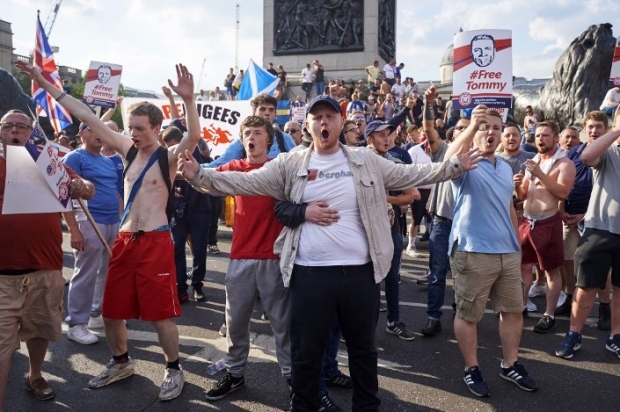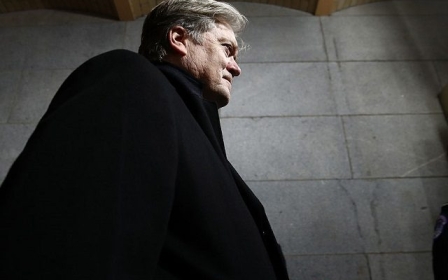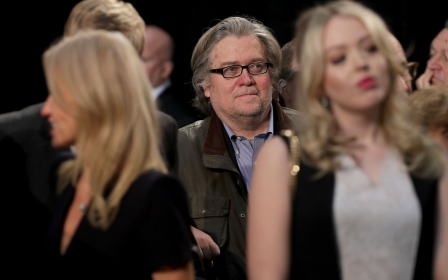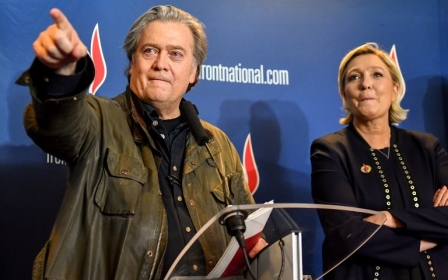Steve Bannon is plotting to take over Europe. We must resist him
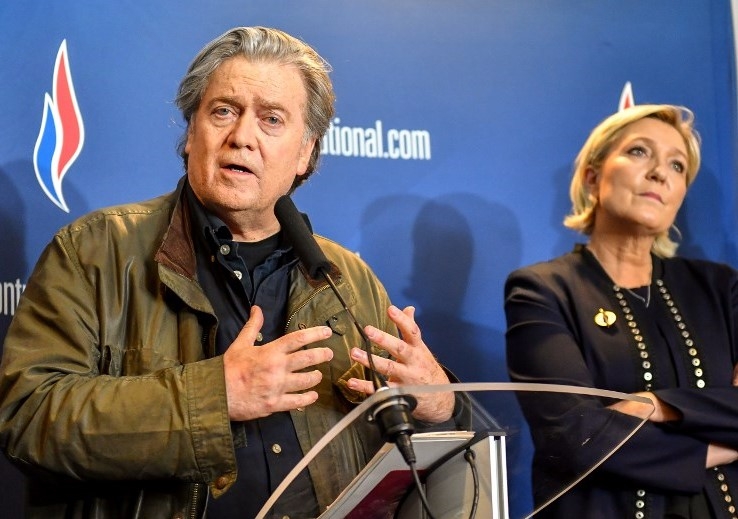
Steve Bannon, Donald Trump's former chief strategist, is turning his attention to Europe. He has visited the continent twice in four months, forging links with far-right groups who will form the bedrock of his newly announced project: building The Movement.
Bannon's tour has included speaking engagements at the French Front National (FN) congress in Lille, a nationalist rally in Zurich and meeting with alt-right figures and groups including Alice Weidel of the far-right Alternative for Germany (AfD) party.
All of which has empowered him to further expand the reach of far-right groups, and attempt to unify them internationally.
A strategic move
Taking inspiration from George Soros' Open Society Foundation, which provides grants to civil society groups, Bannon is launching a foundation which will do the same but to right-wing populist parties. This, despite the fact that he thinks of Soros as politically "evil".
In fact one of Bannon's intellectual allies, Nigel Farage, former leader of the UK Independent Party (UKIP), made a statement earlier this year denouncing Soros and his "influence" in a speech filled with thinly veiled anti-Semitic stereotypes and conspiracy theories.
Bannon's strategy is to destroy the EU from within by electing MEPs who hold a similar line and will spend their term undermining pro-EU agendas
The Movement will be set up in Brussels, the heart of the European Union, which is a strategic move on his part given that his key focus will be to ensure the success of the far-right in the European Parliament elections taking place in May 2019.
Bannon's strategy is to destroy the EU from within by electing MEPs who hold a similar line and will spend their term undermining pro-EU agendas.
Recognising the significance of parties like France's Rassemblement National (formerly the FN) or Italy's League gaining seats, Bannon sees this to be “the real first continent-wide face-off between populism and the party of Davos. This will be an enormously important moment for Europe".
The former Trump advisor will equip his European allies with strategic support including data targeting, PR advice, (mis)information on opposing liberal arguments, as well as fuelling of national tensions through a supposedly anti-establishment lens, and financial backing.
To stress the seriousness of his "vision" to create an alt-right "supergroup", he aims to spend half of the year in Europe, and the other half in the US.
Populism's growing success
While we could just laugh off Bannon's project as being another doomed attempt to scramble for relevance following his rejection from the White House and the defeat of his favoured candidate in a US Senate election, it would be dangerous to ignore what is happening.
The reason that Bannon is so confident to put his name on such a campaign is because he sees the growing success of populist parties and fascist groups which are multiplying on the streets and in the ballot box across the continent.
For many who are actively campaigning against the Tory government, actual Conservative policies are not far removed from the likes of UKIP or even groups further to the right on the political spectrum, especially when it comes to their anti-migrant, racist, and islamophobic agendas.
But the significance of people like Bannon gaining further ground in mainstream political spaces should not be underestimated. Indeed, racism and fascism festers when institutional legitimacy for their ideas is given from the top.
Elite-backed fascism
This process is very clear in the UK. In recent weeks we have seen far-right racists and fascist groups bring tens of thousands of people out on the streets in support of the release of their leader, Tommy Robinson, from prison and in solidarity with the politics of Donald Trump.
The response to the demonstrations was very limited, with counter protests being seriously outnumbered both times.
When in the last 30 years, have we seen fascists so confidently hold a demonstration of that scale in central London of all places, without serious and large-scale opposition? Never. This is frightening and we have to take building such opposition very seriously
- Hannah Dee, Defend the Right to Protest
Hannah Dee, a long-standing antifascist activist from Defend the Right to Protest, stated, "When in the last 30 years, have we seen fascists so confidently hold a demonstration of that scale in central London of all places, without serious and large-scale opposition? Never. This is frightening and we have to take building such opposition very seriously."
It is not possible to make sense of these mobilisations without acknowledging the sharp right turn in elite politics in the UK since the early 2000s and the political impact of the West's ongoing war on terror.
In this period, Muslims - and by extensions migrants and people of colour - have been targeted by the mainstream media, by politicians of all three main parties, as well as by a growing number of repressive laws. The continuous racism generated in such a process - often mobilised in order to detract attention from other economic, social, and political problems - becomes fertile ground for racist street organisations and fascist political parties to emerge.
This has not been limited to the UK either. Belgium, Holland, Germany, France, Italy, Greece, Austria, Hungary, Poland, to just name a few countries, have all seen the rapid rise of a new, confident and aggressive far-right, which Bannon will now try to unite.
Exposing the lies
While mainstream politicians continue to respond to these pressures by replicating their racist demands, a principled anti-racist and anti-fascist politics in our streets and communities is more crucial than ever.
While Bannon focuses on unifying these parties at a European level, our task needs to be to defeat their politics - as well as the social basis that allows their policies to find an echo - on the ground.
We need to mobilise not just against the coming of Trump and his politics, but also against the racism, the violence, and the discrimination coming from our own government.
Simultaneously, it is also time to urgently rebuild a vibrant, grassroots, and diverse anti-fascist movement that can bring together trade unionists, students and activists from across society, from different communities and political traditions, that can oppose the fascists when they march, and demonstrate that a vibrant and militant anti-racist culture continues to thrive across our society.
While the wealthy and powerful amongst the far-right pretend to be anti-establishment with their multi-million-dollar international projects, our task is to expose their lies and point to a progressive alternative on the ground in our communities, in the ballot box, and on the streets.
- Malia Bouattia is an activist, the former president of the National Union of Students, co-founder of the Students not Suspects/Educators not Informants Network and presenter/panellist on British Muslim TV's Women Like Us.
The views expressed in this article belong to the author and do not necessarily reflect the editorial policy of Middle East Eye.
Photo: Former US presidential advisor Steve Bannon (L) speaks to the press as he stands next to Front National (FN) president Marine Le Pen after giving a speech during the FN party annual congress, on 10 March 2018 at the Grand Palais in Lille, northern France (AFP)
New MEE newsletter: Jerusalem Dispatch
Sign up to get the latest insights and analysis on Israel-Palestine, alongside Turkey Unpacked and other MEE newsletters
Middle East Eye delivers independent and unrivalled coverage and analysis of the Middle East, North Africa and beyond. To learn more about republishing this content and the associated fees, please fill out this form. More about MEE can be found here.



